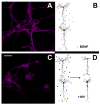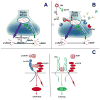Synaptic dysfunction in human immunodeficiency virus type-1-positive subjects: inflammation or impaired neuronal plasticity?
- PMID: 23600400
- PMCID: PMC3633109
- DOI: 10.1111/joim.12050
Synaptic dysfunction in human immunodeficiency virus type-1-positive subjects: inflammation or impaired neuronal plasticity?
Abstract
Many people infected with the human immunodeficiency virus type-1 (HIV) exhibit mild or severe neurological problems, termed HIV-associated neurocognitive disorder (HAND), even when receiving antiretroviral therapy. Thus, novel adjunctive therapies must be developed to overcome the neurotoxic effect of HIV. New therapies require a better understanding of the molecular and cellular mechanisms of HIV-induced neurotoxicity and the risk factors that, besides inflammation and T-cell depletion and drugs of abuse, render the central nervous system (CNS) a target of HIV-induced neurotoxicity. HIV appears to impair neuronal plasticity, which refers to the innate ability of the CNS respond to injury and promote recovery of function. The availability of brain-derived neurotrophic factor (BDNF), a potent neurotrophic factor that is present in abundance in the adult brain, is essential for neuronal plasticity. BDNF acts through a receptor system composed of Trk and p75NTR. Here, we present experimental evidence that some of the clinical features of HIV-mediated neurological impairment could result from altered BDNF/TrkB/p75NTR regulation and function.
© 2013 The Association for the Publication of the Journal of Internal Medicine.
Conflict of interest statement
None of the authors has any financial or other conflicts of interest.
Figures



References
-
- Lucas S. Causes of death in the HAART era. Curr Opin Infect Dis. 2012;25:36–41. - PubMed
-
- Scarlatti G, Tresoldi E, Bjorndal A, et al. In vivo evolution of HIV-1 co-receptor usage and sensitivity to chemokine-mediated suppression. Nat Med. 1997;3:1259–65. - PubMed
-
- Dean M, Carrington M, Winkler C, et al. Genetic restriction of HIV-1 infection and progression to AIDS by a deletion allele of the CKR5 structural gene. Hemophilia Growth and Development Study, Multicenter AIDS Cohort Study, Multicenter Hemophilia Cohort Study, San Francisco City Cohort, ALIVE Study. Science. 1996;273:1856–62. - PubMed
Publication types
MeSH terms
Substances
Grants and funding
LinkOut - more resources
Full Text Sources
Other Literature Sources

